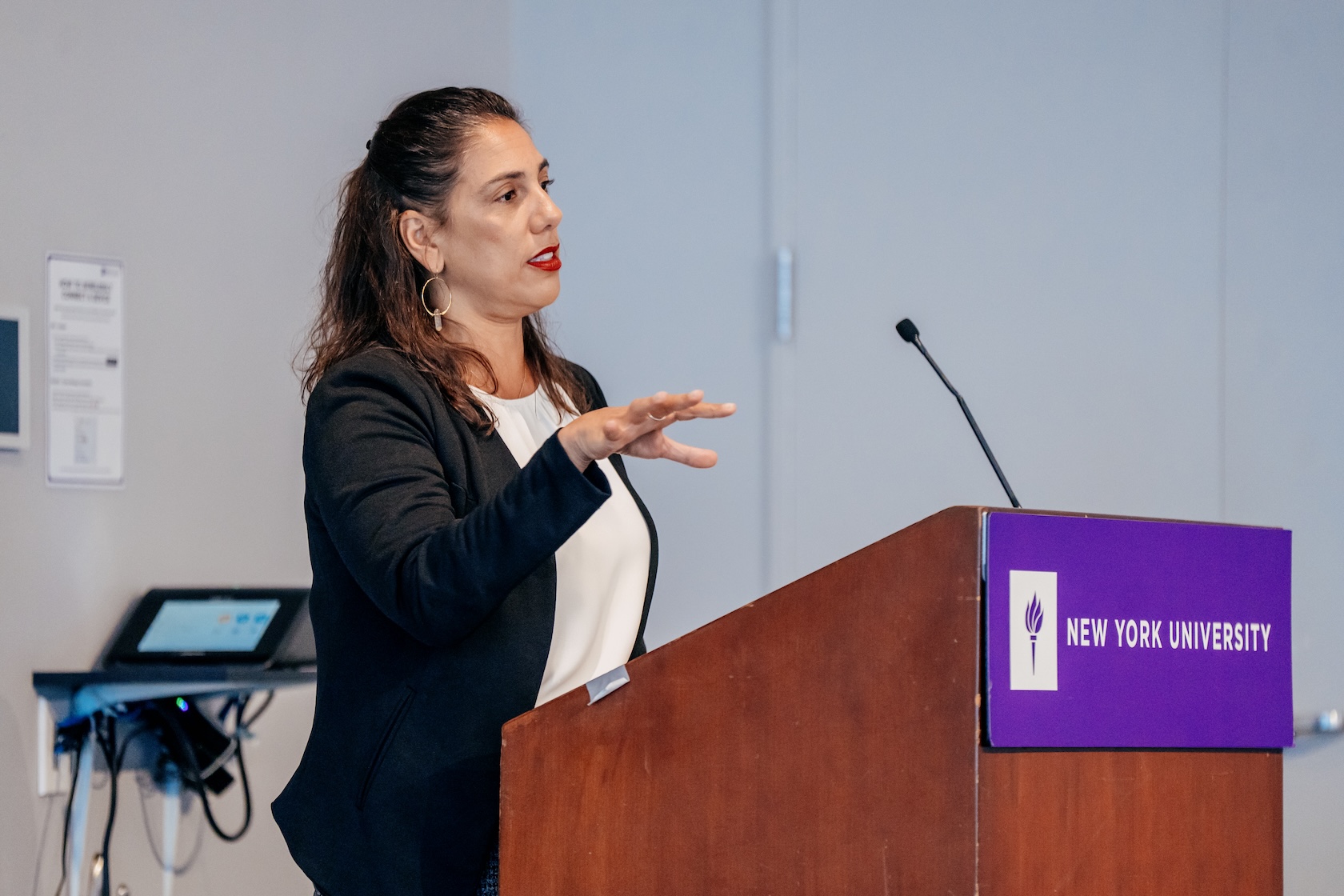Event Recap: Mass Transit and Climate Change
On September 26th, 2024, the NYU Rudin Center for Transportation, in collaboration with AECOM and the NYU C2SMARTER Center, held a thought-provoking panel discussion titled "Mass Transit & Climate Change." The event brought together key executives in the transportation sector to explore the critical role of mass transit in combating climate change.
@Braddock Jr.: Courtesy of NYU Photo Bureau
Sarah M. Kaufman, Director of the NYU Rudin Center for Transportation, opened the event by highlighting the growing challenges of climate change. In the longstanding, critical intersection – the complex relationship between climate change and our mobility systems – our stations, streets and tracks are increasingly bombarded by extreme weather events; and simultaneously, the very systems that connect us can contribute to the climate crisis.
Veronica Vanterpool, Deputy Administrator for the Federal Transportation Administration (FTA), delivered keynote remarks that set the stage for the panel discussion. She focused on the federal government's investments in communities nationwide, aimed at improving both the usefulness and climate resilience of public transportation.

@Braddock Jr.: Courtesy of NYU Photo Bureau
Distinguished Panelists
The discussion featured three prominent figures in the transportation industry:
- Veronica Vanterpool - Deputy Administrator, Federal Transportation Administration (FTA)
- Jamie Torres-Springer - President, Metropolitan Transportation Authority (MTA) Construction & Development
- Tom Prendergast - Executive Vice President & New York Metro Chief Executive, AECOM
The panel was moderated by Sarah Kaufman.
@Braddock Jr.: Courtesy of NYU Photo Bureau
Key Discussion Points
MTA's Five-Year Capital Plan
Jamie Torres-Springer introduced the MTA's recently approved five-year capital plan, which proposes a $60 billion investment to modernize critical system assets, as well as bringing assets into a state of good repair. A key component of this plan is the introduction of zero-emission buses, aimed at further reducing New York's transit system carbon footprint. The success of this initiative, aligned with the MTA’s zero emission targets, hinges upon the FTA approving and allocating federal grant funds to the New York area.
Balancing Priorities: Modernization and Climate Resilience
The panelists unanimously agreed that the MTA is addressing system upgrades and extreme weather resilience concurrently, rather than as separate issues. This integrated approach involves the MTA’s close coordination with partner agencies, including Con Edison, NYC Department of Transportation, and NYC Department of Environmental Protection. Such collaborations facilitate innovative solutions, like pantograph charging for electric buses (a method of charging EV buses from depot ceilings).
Federal Investment in Transit Infrastructure
Veronica Vanterpool highlighted the Biden-Harris administration's record investments in transit infrastructure through the Infrastructure Investment and Jobs Act. Vanterpool, who leads the allocation of federal grant funds to local transportation agencies, has worked with both urban and rural systems to bolster innovation around the country. She emphasized the importance of tailoring program execution to each community's unique needs, ensuring maximum utilization of federal investments. Key considerations include:
- Adequate parking near transit stations to facilitate intermodal connections
- Positioning systems in higher-density areas
- Promoting transit-oriented development in less dense regions, which has the potential to transform both public transit ridership and housing affordability in previously underserved areas.
Pragmatic Approach to Large-Scale Projects
Drawing from his extensive experience in both public and private sectors, Tom Prendergast stressed the need for pragmatism in executing large, crucial projects. He acknowledged challenges such as supplier constraints and policy landscapes that can extend timelines, while emphasizing the importance of maintaining carbon emission reduction as a key priority for MTA leadership.
Equity in Program Implementation
The panelists underscored the role of equity in program implementation. They noted that zero-emission programs, particularly those electrifying bus depots and vehicles, are expected to have the greatest impact on underserved communities, addressing issues like poor air quality and high asthma rates. Moreover, they highlighted the economic opportunities that efficient transit can offer to these communities.
The Role of Academia
When asked about the role of academic institutions like NYU in furthering sustainability goals in public transportation, the panelists emphasized several key points:
- Academia's ability to propose unconstrained, innovative ideas that agencies might struggle to conceive due to systemic constraints.
- The importance of research centers producing data-driven reports that advocate for crucial government initiatives.
- The value of sharing economic and demographic analyses (exemplified by the NYU Rudin Center’s study on the proposed Interborough Express)
@Braddock Jr.: Courtesy of NYU Photo Bureau
Looking Ahead
The panelists encouraged continued dialogue between academic research centers, policymakers, and transit agencies to ensure that sustainability remains at the forefront of transportation planning.